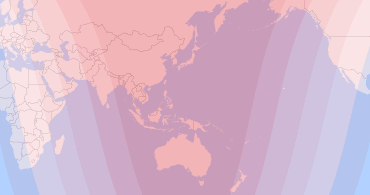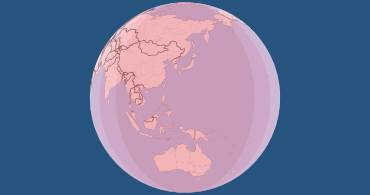This eclipse is visible in Tokyo - go to local timings and animation
Where to See the Eclipse
Try our new interactive eclipse maps. Zoom in and search for accurate eclipse times and visualizations for any location.
Regions seeing, at least, some parts of the eclipse: Europe, Asia, Australia, Much of Africa, Much of North America, Pacific, Atlantic, Indian Ocean, Arctic, Antarctica.
This eclipse is visible in Tokyo - go to local timings and animation
Eclipse Map and Animation
The animation shows where this total lunar eclipse is visible during the night (dark “wave” slowly moving across the Earth's surface).
Shades of darkness
Night, moon high up in sky.
Moon between 12 and 18 degrees above horizon.
Moon between 6 and 12 degrees above horizon. Make sure you have free line of sight.
Moon between 0 and 6 degrees above horizon. May be hard to see due to brightness and line of sight.
Day, moon and eclipse both not visible.
Note: Twilight will affect the visibility of the eclipse, as well as weather.
The entire eclipse is visible from start to end.
The entire partial and total phases are visible. Misses part of penumbral phase.
The entire total phase is visible. Misses part of partial & penumbral phases.
Some of the total phase is visible. Misses part of total, partial & penumbral phases.
Some of the partial phase is visible. Misses total phase and part of partial & penumbral phases.
Some of the penumbral phase is visible. Misses total & partial phases.
The eclipse is not visible at all.
Note: Areas with lighter shadings left (West) of the center will experience the eclipse after moonrise/sunset. Areas with lighter shadings right (East) of the center will experience the eclipse until moonset/sunrise. Actual eclipse visibility depends on weather conditions and line of sight to the Moon.
When the Eclipse Happens Worldwide — Timeline
Lunar eclipses can be visible from everywhere on the night side of the Earth, if the sky is clear. From some places the entire eclipse will be visible, while in other areas the Moon will rise or set during the eclipse.
| Eclipse Stages Worldwide | UTC Time | Local Time in Tokyo* | Visible in Tokyo |
|---|---|---|---|
| Penumbral Eclipse begins | 2月14日 (水)12時13分14秒 | 2月14日 (水)21時13分14秒 | Yes |
| Partial Eclipse begins | 2月14日 (水)13時26分04秒 | 2月14日 (水)22時26分04秒 | Yes |
| Full Eclipse begins | 2月14日 (水)14時41分41秒 | 2月14日 (水)23時41分41秒 | Yes |
| Maximum Eclipse | 2月14日 (水)15時15分36秒 | 2月15日 (木)0時15分36秒 | Yes |
| Full Eclipse ends | 2月14日 (水)15時49分33秒 | 2月15日 (木)0時49分33秒 | Yes |
| Partial Eclipse ends | 2月14日 (水)17時05分10秒 | 2月15日 (木)2時05分10秒 | Yes |
| Penumbral Eclipse ends | 2月14日 (水)18時17分55秒 | 2月15日 (木)3時17分55秒 | Yes |
* The Moon is above the horizon during this eclipse, so with good weather conditions in Tokyo, the entire eclipse is visible.
Quick Facts About This Eclipse
| Data | Value | Comments |
|---|---|---|
| Magnitude | 1.195 | Fraction of the Moon’s diameter covered by Earth’s umbra |
| Obscuration | 100.0% | Percentage of the Moon's area covered by Earth's umbra |
| Penumbral magnitude | 2.285 | Fraction of the Moon's diameter covered by Earth's penumbra |
| Overall duration | 6 hours, 5 minutes | Period between the beginning and end of all eclipse phases |
| Duration of totality | 1 hour, 8 minutes | Period between the beginning and end of the total phase |
| Duration of partial phases | 2 hours, 31 minutes | Combined period of both partial phases |
| Duration of penumbral phases | 2 hours, 26 minutes | Combined period of both penumbral phases |
Eclipse calculations usually accurate to a few seconds

An Eclipse Never Comes Alone!
A solar eclipse always occurs about two weeks before or after a lunar eclipse.
Usually, there are two eclipses in a row, but other times, there are three during the same eclipse season.
This is the second eclipse this season.
First eclipse this season: 2120年1月30日火曜日 — Partial Solar Eclipse

